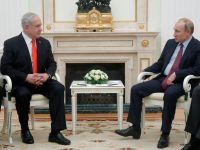Now that they have signed an accord officially ending more than two years of war, the real work of peace begins for Ethiopia and Eritrea.
The deal was signed Tuesday in Algiers, with more cordiality than expected between Ethiopian Prime Minister Meles Zenawi and Eritrean President Issaias Afeworki.
The two leaders' handshake followed a period of more than 30 months during which the pair never spoke to each other.
It also came just a few days after Meles said the deal would not bring about instant reconciliation, and that such a development would only be possible with someone other than Afeworki in power in Asmara.
Settling the border dispute that sparked the war in May 1998 is an important part of the peace process, but only one of many issues that require resolution.
The accord provides for a commission to demarcate the frontier, which was never clearly defined when Eritrea gained independence from Ethiopia in 1993.
The war has left tens of thousands of dead on each side and displaced some 1.3 million people.
Mutual rancor has been fuelled by both countries' practice of deporting the others' nationals, no matter how long they had been living in the neighboring state.
The conflict left at least two important trading towns in ruins: Zala Anbesa in northern Ethiopia and Tesseney in southwest Eritrea. There have been numerous accusations that churches and clinics in border areas have been looted.
For more than a year, Addis Ababa has been calling for compensation for Ethiopian goods stuck in the Eritrean ports of Assab and Massawa.
On Monday, Ethiopian authorities set up a system to compensate its citizens for damages resulting from the war and caused by Eritrea.
The peace accord sets out the framework for future negotiations on compensation and also on talks about the origins of the conflict and on the exchange of prisoners of war.
"It's another kind of battle that will be fought on legal terrain," remarked one Western diplomat in Addis Ababa.
"Even if the signing of the peace accord is a positive development, there is much left to do in terms of normalizing relations," Organization of African Unity Secretary General Salim Ahmed Salim said in Algiers on Tuesday.
Still, there is already reason for optimism. Not a shot has been fired on the border since both countries formally agreed to halt the war in June.
The United Nations has begun to deploy the first troops of a peacekeeping force that will eventually number some 4,500 men.
And foreign donors are expected to respond favorably to UN Secretary General Kofi Annan's appeal for funds to help in the reconstruction and development of Ethiopia and Eritrea -- ADDIS ABABA (AFP)
© 2000 Al Bawaba (www.albawaba.com)







